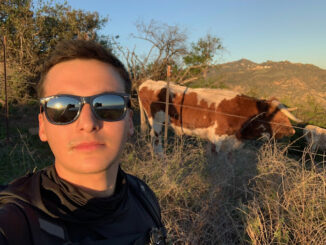
Pepperdine’s International Programs begin advertising its locations as soon as students step foot on campus.
Ria Frenzel, a junior art history major, saw the International Programs presentation at New Student Orientation and began thinking about where she would want to go.
Frenzel did her research, picked Florence, Italy, as her first-choice program, applied and waited for her decision.
And Frenzel got into Heidelberg, Germany, a program she had ranked low on her list.
Though disappointed, Frenzel went to Germany, and was so pleased with her decision that she extended her program through the spring semester and declared a German minor.
“I know it can be really disheartening not getting into your top-choice program,” Frenzel said. “I know I was really upset, I even considered not going abroad because I didn’t get my top choice, but I think at the end of the day your abroad experience is really what you make it.”
A Pepp Post poll of 52 students found that overall, students thought the program and term they got into was the right fit for them, regardless of where they originally applied.
International Program staff highlighted essential application tips, including the importance of the video and meeting the faculty-in-residence. They also noted how COVID-19 affected the application process and how important an open mind is to the process.
Student learn to have open minds
Psychology Professor Steve Rouse said students with higher self-esteem and perseverance have an easier time overcoming rejection and could be more open-minded to other programs.
During Rouse’s time as a faculty-in-residence overseas, he was able to see students transform from being closed off about a program to open-minded and enjoying it.
“Depending on a person’s theological belief system, some people I have known have come to a conclusion that plan B was actually better for them than what plan A would have been,” Rouse said.
The poll showed similar results with around 59% of students getting into their first-choice program and feeling satisfied. Around 31% of students did not get into their first-choice program but still felt satisfied.
Austin LeDe’, a junior sport administration major, followed this trend. He applied to Florence for the academic year, only to get an acceptance email to the Heidelberg program, much like Frenzel.
“I was like a little underwhelmed honestly and a little nervous going because I didn’t know anyone but then I got there and honestly it was awesome,” LeDe’ said.
Alison Peraza, a sophomore business administration major, was in a similar situation. While she did get into her first-choice program of London, she was accepted for the spring term even though she initially wanted the fall term.
“I’m really excited to go in the spring,” Peraza said. “I think it worked out better that I’m going in the spring, but I remember last year being upset that I wasn’t going in the fall.”
Junior accounting major Clara Taggart said she was rejected from all the programs she ranked.
Even after this setback, Taggart was able to reapply and go abroad for a semester in Buenos Aires, Argentina.
“It’s hard to say how things would have worked out had I been admitted to my first-choice, but I think it worked out for the best,” Taggart said.
Nick Susino, a junior international business major, had a similar experience. Susino was rejected from all his choices, re-applied and got into BA.
Susino also went to the Japan Summer 2023 program – his first-choice for that application. He believes he learned from his mistakes on his first application.
“I wish I was more kind of just like, I don’t want to say honest but almost just like truer to my voice,” Susino said.
Senior psychology major Tess Bridgesmith said she was also rejected from her first-choice program of Florence, Italy, for the spring semester. She instead got into Lausanne, Switzerland for the spring semester.
Bridgesmith ranked this program second and she ended up loving being in a bigger program.
“Looking back, I really did end up in the best location for me,” Bridgesmith said.
Unlike Bridgesmith, Raquel Reyes, a sophomore integrated marketing communication major, got into her first-choice program of Hauteville, Switzerland, for the year and is studying there now.
Reyes said she is enjoying her experience.
“I personally was attracted to the Switzerland program,” Reyes said. “But I think I would have had just as fun anywhere else.”
Kianna Kotas, a first-year business administration major, just went through the application process. She applied to the Japan Summer 2024 and BA Spring 2025 programs.
She was accepted into the BA Spring 2025 program and was waitlisted for the Japan Summer 2024 program.
Kotas said she believes that going somewhere different would not affect her enjoyment of the experience.
IP staff give application tips
The poll showed that around 33% of students did not think they had enough information about the application and that around 10% of students were not proud of their applications.
Rachel Brown, associate director for study abroad enrollment and preparations, recommended that students do their research.
“Try to kind of do some homework on the front end,” Brown said.
Brown said while two thirds of students who apply will get into their first-choice program, most students end up saying that regardless of where they go, they ended up in the right place, so keep an open mind.
The poll showed that around two thirds of the students surveyed did get into their first-choice program.
Brown said students should trust the process. Many students have been waitlisted and spaces will open up.
The poll found that about 19% of students got off the waitlist and into their first-choice program and 37% of students switched into an available program.
Charlie Engelmann, the senior director of operations for International Programs, said International Programs looks for students who will contribute to their community and will encourage cross-cultural learning amongst the group. “The ideal applicant is one who can contribute to their community in a unique way and that are legitimately interested in the experience of living abroad,” Engelmann said. Abby Jo Budiwarman, a junior international business major, emphasized the importance of the video question. Budiwarman went to London for the academic year and is currently the London ambassador. “The video is the best opportunity for you to show who you are and I think for me it really did show who I was the best,” Budiwarman said. Engelmann also highlighted the benefits of students meeting the faculty-in-residence of their desired program. “Students can kind of go in eyes wide open as they go through this important decision making process,” Engelmann said. The poll showed that 53% of students didn’t meet their faculty-in-residence while applying, while around 39% did. Program capacity varies Brown said other things students should consider are that the Florence and London programs have many applications but the least amount of space. The Hauteville program also has many applications, but due to the new chateau, there are more spaces available. “Florence has been a very popular program and so has our London program,” Brown said. “Those are two of our programs that tend to have the lowest capacity.” Brown said they reserve more spaces for students who apply for the year, making semester programs competitive. Engelmann said they hope to have an Asia program by Fall 2025. This will add more beds and diversify the abroad portfolio.

Engelmann said COVID-19 forced the study-abroad locations to close and then reduced capacity when they reopened, and afterward, there was an uptick in summer and upperclassmen applications.
“During the heart of COVID our biggest challenge was that we had to reduce capacity,” Engelmann said.
Brown said a backlog of students after COVID-19 also led to additional applications.
Susino said the applications seemed more competitive after COVID-19 since it was not just sophomores applying.
Engelmann said in an email that programs are now back at full capacity.




